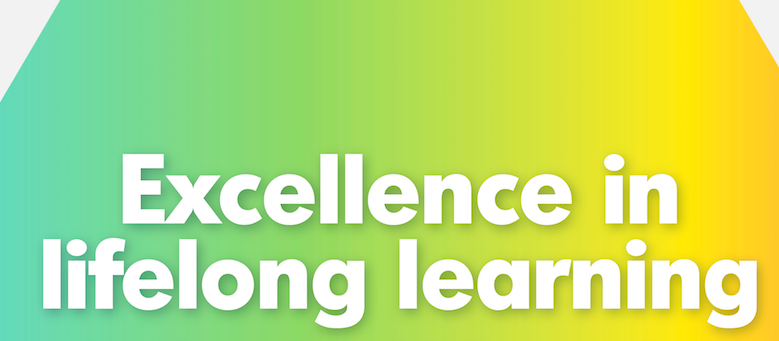
The pursuit of excellence
In the last of ETF’s LearningConnects series on Lifelong Learning, the focus was on the pursuit of excellence. Ikram Charrai, Career Advisor at Esith, (Ecole Supérieure des Industries du Textile et Habillement), Morocco, and Zan Dapcevic, CEO at Academia College of Short-Cycle Higher Education, Slovenia, shared their best practices as applied to lifelong learning. They were joined by Mariavittoria Garlappi, ETF Senior Specialist in Human Capital Development, and part of the team running the ENE Network of centres of vocational excellence, of which both Ikram and Zan are members. ETF’s Daria Santucci moderated the session.
Garlappi began by presenting the scope of the network which includes dozens of vocational centres that are involved with the many subjects concerning lifelong learning. Our societies are subject to continuous change, she said. These centres for vocational excellence should be driving this change and accompanying people in constant updating, reskilling, and upskilling in a progressive approach throughout life.
Charrai and Dapcevic talked about the students in their respective centres. At Esith, the result of a public-private partnership designed to grow a key sector in the Moroccan economy, it’s possible to get both higher education training which offers courses to employees, or initial training. Two programmes in vocational education are both recognized by the Ministry of national education and vocational training. Those already working can take short courses or a two-year executive program on weekends. There are 1300 students in initial training courses.
Dapcevic’s school is a private, family-run enterprise that was founded 25 years ago when Slovenia became independent. As foreign companies entered Slovenia, and factories closed, the workforce needed to be reskilled and upskilled. From the start, the college has supported lifelong learning, working with partner companies and industries, and running specifically targeted programmes for adult learners. The college works with government projects and is accredited to give certificates for adult learning.
The development of entrepreneurial skills is also an important feature within the ENE network, and these are essential for excellence and lifelong learning, said Garlappi. Entrepreneurship should be a mindset, she said, adding that this doesn’t mean people will become entrepreneurs but rather, need to know how to spot opportunities, be creative, take risks, and work within teams.
Some examples of lifelong learning activities that are successful are activities not necessarily linked to academia, but extracurricular, said Charrai. Dapcevic agreed, adding that entrepreneurship studies are included in every program that they run, to see what kind of value students can bring to the workplace.
Some other successful features include tailoring programmes to the industrial sector’s needs, with team-based short courses for employees year-round in the case of Esith.
Dapcevic said that in Slovenia they follow a modular way of learning that suits adult learners. They bring in a vocational context to their assessments so that students can immediately apply what they have learned to their jobs. Inspiration and teamwork are essential for motivation.
Taking a question from an audience member in Iran, Dapcevic and Charrai spoke about integrating soft skills into VET training, which need to be carefully integrated into a well-designed programme, said Dapcevic. Charrai said her school considers soft skills to be very important. They have a career centre where they identify which soft skills students may need.
In some countries, however, VET is seen as a second chance vis a vis an academic degree, so how can VET be made more attractive? Garlappi said it was all about credibility and communicating about success stories. It’s also necessary to make sure that VET isn’t outdated, so the needs of companies as well as the public sector need to be monitored. Dapcevic said that his school can use data to promote VET since their students enter the job market faster and earn higher salaries than bachelor’s degree graduates. Charrai said that the trend in Morocco is to go for extra degree and training, and that success stories should be communicated to attract more students.
VET centres are also a reflection of the ecosystem connected to the real economy, said Dapcevic. There have been changes in his city and the entire country and VET needs to be adapted to these changes. Training was first focused on soft skills, then business, and engineering, and now digitization is the key component. In Slovenia the risk of automation is very high, and to remain competitive it is essential to adapt quickly.
Since Morocco positions itself as a hub for Africa, and Esith caters to the industrial sector, Charrai said adapting to new trends in market, of which automation and digitization are key components, is a must.
To stay on top of these processes to ensure excellence, Dapcevic said a concrete example of what his school does is that they standardise their processes and use a regulator from the UK who makes external visits to sample students’ work and provides expertise.
The HR department and the ongoing education centre at Esith have a quality assurance process to assess training and the students’ learning experience yearly, said Charrai.
Lastly, what are best way to ensure the outcomes of lifelong learning?
Dapcevic put forth an example from a business school in Norway which gives an expiration date to degrees and qualifications, ensuring that you remain qualified with lifelong learning. Charrai said degrees have already expired, and jobs are disappearing from the market—lifelong learning is inevitable. Garlappi ended the conversation by adding that mechanisms of validation for non-formal and informal learning should be empowered as well. This too, is part of lifelong learning and gives value to people’s efforts.
Did you like this article? If you would like to be notified when new content like this is published, subscribe to receive our email alerts.